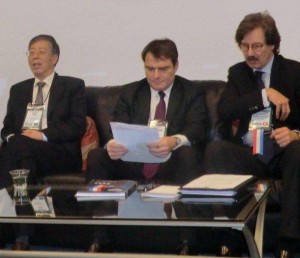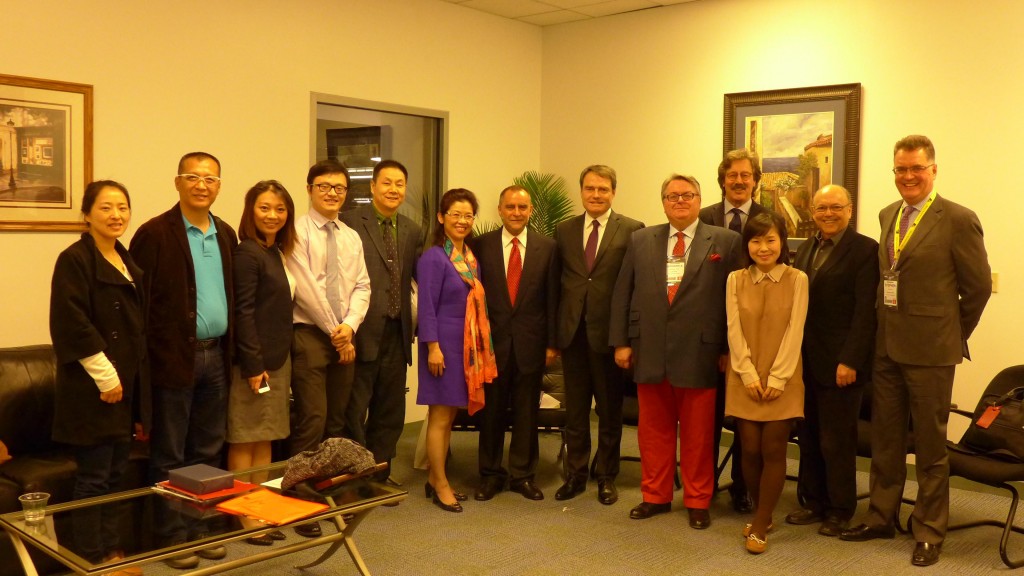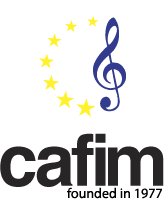Progress and Success with Sino-European Dialogue
China to reduce customs duties on musical instruments – Cooperation in fields of musical education, military music as well as in research and development. Efforts underway to combat trademark piracy and counterfeit products
There are signs of distinct progress emerging as a result of the Sino-European talks held between delegates of the Confederation of European Music Industries (CAFIM) and China Musical Instrument Association (CMIA).
Sino-Europäischer Dialog mit Fortschritten und Erfolgen
China wird Zoll auf Musikinstrumente senken – Kooperation in den Bereichen Musikerziehung, Forschung & Entwicklung sowie Militärmusik, Markenpiraterie und Plagiate angestrebt
Ausgesprochen erfreulich entwickelt sich der sino-europäische Dialog zwischen den Delegierten des europäischen Verbandes, der Confederation of European Music Industries (CAFIM) und des chinesischen Verbandes China Musical Instrument Association (CMIA)

Legends Left to right:
An Zhi, President of the China Musical Instrument Association (CMIA),
Antoine Beaussant, President of the Confederation of European Music Industries (CAFIM),
Winfried Baumbach, Secretary General of the Confederation of European Music Industries (CAFIM)
This welcome news update is based on a report issued by the President of the CMIA, An Zhi, at a meeting held in conjunction with the recent NAMM Winter Market stating that by 2015 China will have brought about a provisional 1% reduction in ‘customs duties’ imposed on musical instruments referencing to membership in the World Trade Organization (WTO).
Antoine Beaussant, President of CAFIM and CEO of the Buffet Group expressed his gratitude at this remarkable piece of news, attributing it to the success achieved in pursuing joint dialogue and consultation over the past number of years.
An Zhi stressed that there were signs of some constructive development being attained in combating trademark piracy and counterfeit products, one example of such success being “Petrof” referred to as a positive outcome of the talks.
The Chinese delegates likewise addressed problems caused by misleading brand names applied to imported merchandise. Offers of help and support came from the Secretary General of CAFIM in the effort to bring about speedy clarification in contentious cases in consultation with members of CAFIM thus affected.
‘Musical Education’ qualifies for essential importance in the work of both associations, the CMIA and CAFIM. The Chinese delegates displayed enormous interest in both the French model “Orchestre à l’école” and the German “Music-in-the-Classroom” concept. Information material on DVD and other media were made available. In connection with the “Music China” expo this coming October it was agreed to arrange for members to sit in and observe teaching lessons at the German School in Shanghai applying the “Music-in-the-Classroom” method to wind instrument instruction, thus examining the potential provided for possible cooperation.
‘Research & Development’ is a topic of immense interest to manufacturers of musical instruments. It was proposed to investigate opportunities for cooperation involving the Beijing Research Institute of Musical Instrument and the Institut de Recherche et Coordination Acoustique/Musique (IRCAM) in Paris, the Laboratoire d’Acoustique de l’Université and the Centre National de Promotion des Metiers de la Musique, both headquartered in Le Mans, as well as the Institute of Musical Instrument Making in Zwota in addition to universities.
Interest also prevails in establishing contact to military music corps in China and Europe with a view to engaging in joint cooperation.
The meeting held in Anaheim, southern California, served to endorse the numerous points in common linking Europe with China and the wealth of opportunity for cooperation. The presidents of both organizations, An Zhi of the China Musical Instrument Association (CMIA) and Antoine Beaussant representing the Confederation of European Music Industries (CAFIM), reaffirmed their strong commitment to aim at and ensure competitive conditions based on fairness for the benefit of association members guided by a fundamental policy of trust and friendship.

Confederation of European Music Industries (CAFIM), the central organization representing the European Music Industry was founded in Frankfurt in 1977. The founding fathers were definitely agreed that organization in an association in what was then a Europe in a state of development was essential in order to solve supranational issues such as customs duties and import problems, while dealing with and exercising an influence on such issues and other concerns along effective lines.
As unification within Europe gradually progressed, the general industrial federation of music industries – originally restricted to manufacturers – came to cover the entire branch, i.e. production and distribution, e.g. wholesalers, retailers and importers. The number of member associations has increased not least on account of eastward expansion of the EU. Today, the Delegates Assembly comprises representatives from Germany, France, the UK, Italy, Norway, Portugal, Austria, Switzerland, Slovenia, Spain, the Czech Republic, the Ukraine and Hungary.
Vision
Proceeding from the joy experienced in making music constituting an essential part of daily life, everyone – children in particular – regardless of their background, should be given the chance not only of acquainting themselves with musical instruments, but ideally with a view towards actually learning to play one.
Mission
To sustain and promote the interests of the Music Industry.
To popularize the pleasure derived from music-making among the general public.
Tasks & Objectives
– Promotion of music-making activities in all situations of life no matter where
– Enhancement of the music-learning status in the education sector
– Promotion of music schools and musical education at all levels
– Augmentation of the Music Industry’s share and claim to leisure spending
Harmonization of standards on a European-wide scale
– Representation, protection and promotion of interests towards European institutions/the European Commission
– Provision, organization and implementation of forums for debating and negotiating mutual interests and issues (e.g. environmental issues and other concerns)
– Promotion of consultation and cooperation facilities
Erfreulich, da CMIA-Präsident An Zhi, im Rahmen des kürzlich zur amerikanischen Musikmesse, des NAMM Winter Markets, stattgefundenen Treffens informierte, dass China bis 2015, unter Bezug auf die Mitgliedschaft in der Welthandelsorganisation (WTO), den ‚Zoll‘ für Musikinstrumente auf voraussichtlich 1 Prozent senken wird.
CAFIM-Präsident Antoine Beaussant und Vorstandsvorsitzender (CEO) der Buffet Group, dankte für diese bemerkenswerte Nachricht und hob hervor, dass dies als Erfolg der gemeinsamen Gespräche der letzten Jahre zu werten ist.
In gleicher Weise hob An Zhi hervor, dass es hinsichtlich ‚Markenpiraterie und Plagiate‘ positive Entwicklungen zu verzeichnen gibt. So ist es gelungen, beispielsweise „Petrof“ betreffend, erfolgreich zu sein. Auch dies wertete er als positives Ergebnis der Gespräche.
Die chinesischen Delegierten sprachen ferner die Problematik irreführender Markennamen von Importwaren an. Seitens des Generalsekretariats der CAFIM wird Hilfe und Unterstützung angeboten, um in strittigen Fällen eine schnelle Klärung unter Hinzuziehung betroffener CAFIM-Mitglieder zu erreichen.
‚Musikerziehung‘ bildet im Rahmen der Verbandsarbeit von CMIA und CAFIM einen wesentlichen Schwerpunkt. Sehr interessiert zeigten sich die chinesischen Delegierten an dem französischen Modell „Orchestre à l’école“ und am deutschen Weg „KlassenMusizieren“. Dazu wurden Informationsmaterialien auf DVD, etc. zur Verfügung gestellt. Ferner wurde vereinbart, zur „Music China“ im Oktober an der Deutschen Schule in Shanghai, die das Programm „KlassenMusizieren mit Blasinstrumenten“ praktiziert, zu hospitieren und zu prüfen, welche Möglichkeiten der Kooperation bestehen.
‚Forschung & Entwicklung‘ ist ein insbesondere die Hersteller von Musikinstrumenten sehr interessierendes Thema. Angeregt wurde, Kooperationsmöglichkeiten zwischen dem Beijing Research Institute of Musical Instrument sowie dem Institut de Recherche et Coordination Acoustique/Musique (IRCAM) in Paris, dem Laboratoire d’Acoustique de l’Université sowie Le Centre National de Promotion des Metiers de la Musique, beide in Le Mans und dem Institut für Musikinstrumentenbau in Zwota sowie Universitäten zu prüfen.
Ferner besteht Interesse, mit ‚Militärmusikkorps‘ in China und Europa und Verbindungen herzustellen und zu kooperieren.
Das Treffen im südkalifornischen Anaheim zeigte einmal mehr die zahlreichen Gemeinsamkeiten Europas und Chinas sowie die vielfältigen Möglichkeiten zusammenzuarbeiten. Die Präsidenten beider Organisationen, An Zhi, China Musical Instrument Association (CMIA) und Antoine Beaussant, Confederation of European Music Industries (CAFIM) bekräftigten ihren festen Willen, faire Wettbewerbsbedingungen zum Wohle der Verbandsmitglieder anzustreben und sicherzustellen wie auch die freundschaftliche und vertrauensvolle Grundhaltung.
Bildlegende: v.l.n.r.
An Zhi, Präsident der China Musical Instrument Association (CMIA
Antoine Beaussant, Präsident der Confederation of European Music Industries (CAFIM)
Winfried Baumbach, Generalsekretär der Confederation of European Music Industries (CAFIM)
Confederation of European Music Industries (CAFIM), der Spitzenverband der europäischen Musikwirtschaft, wurde 1977 in Frankfurt gegründet. Die Gründungsväter waren sich einig, in dem sich entwickelnden Europa verbandlich organisiert zu sein zur Lösung supranationaler Fragen, wie z.B. Zölle und Importprobleme, um diese und weitere Themen auf europäischer Ebene zu behandeln und wirksam beeinflussen zu können.
Mit fortschreitendem Vereinigungsprozess innerhalb Europas öffnete sich der zunächst auf Hersteller begrenzte Industrieverband für die gesamte Musikinstrumentenbranche, d.h. Herstellung, Vertrieb, Groß- und Einzelhandel sowie Import. Nicht zuletzt durch die Osterweiterung der EU vergrößerte sich die Zahl der Mitgliedsverbände. Heute gehören der Delegiertenversammlung Vertreter aus Deutschland, Frankreich, Großbritannien, Italien, Norwegen, Portugal, Österreich, Schweiz, Slowenien, Spanien, Tschechien, Ukraine und Ungarn an.
Vision
Ausgehend davon, dass die Freude am Musizieren ein wertvoller Bestandteil des täglichen Lebens ist, soll es allen Menschen, insbesondere Kindern, unabhängig von ihrer Herkunft, ermöglicht werden, Musikinstrumente nicht nur kennen-, sondern im Idealfall auch, zumindest eines, spielen zu lernen.
Auftrag
Die Musikwirtschaft stärken und fördern durch Vertretung ihrer Interessen.
Das Vergnügen am und den Nutzen des Musizierens in der Öffentlichkeit, der Bevölkerung bekannt zu machen und zu fördern.
Aufgaben
– Fördern des Musizierens in allen Lebenslagen und Bereichen
– Verbessern des Stellenwertes der Musikerziehung im Bildungswesen
– Fördern der Musikschulen und Musikerziehung auf allen Ebenen
– Erhöhen des Anteils der Branche an den Freizeitausgaben
– Harmonisieren von Standards europaweit
– Vertreten, schützen und fördern der Interessen gegenüber europäischen Institutionen/der europäischen Kommission
– Anbieten, organisieren und durchführen von Foren zur Diskussion und Verhandlung gemeinsamer Interessen und Themen (u.a. z.B. Umweltfragen)
– Fördern von Konsultationen und Kooperationen
